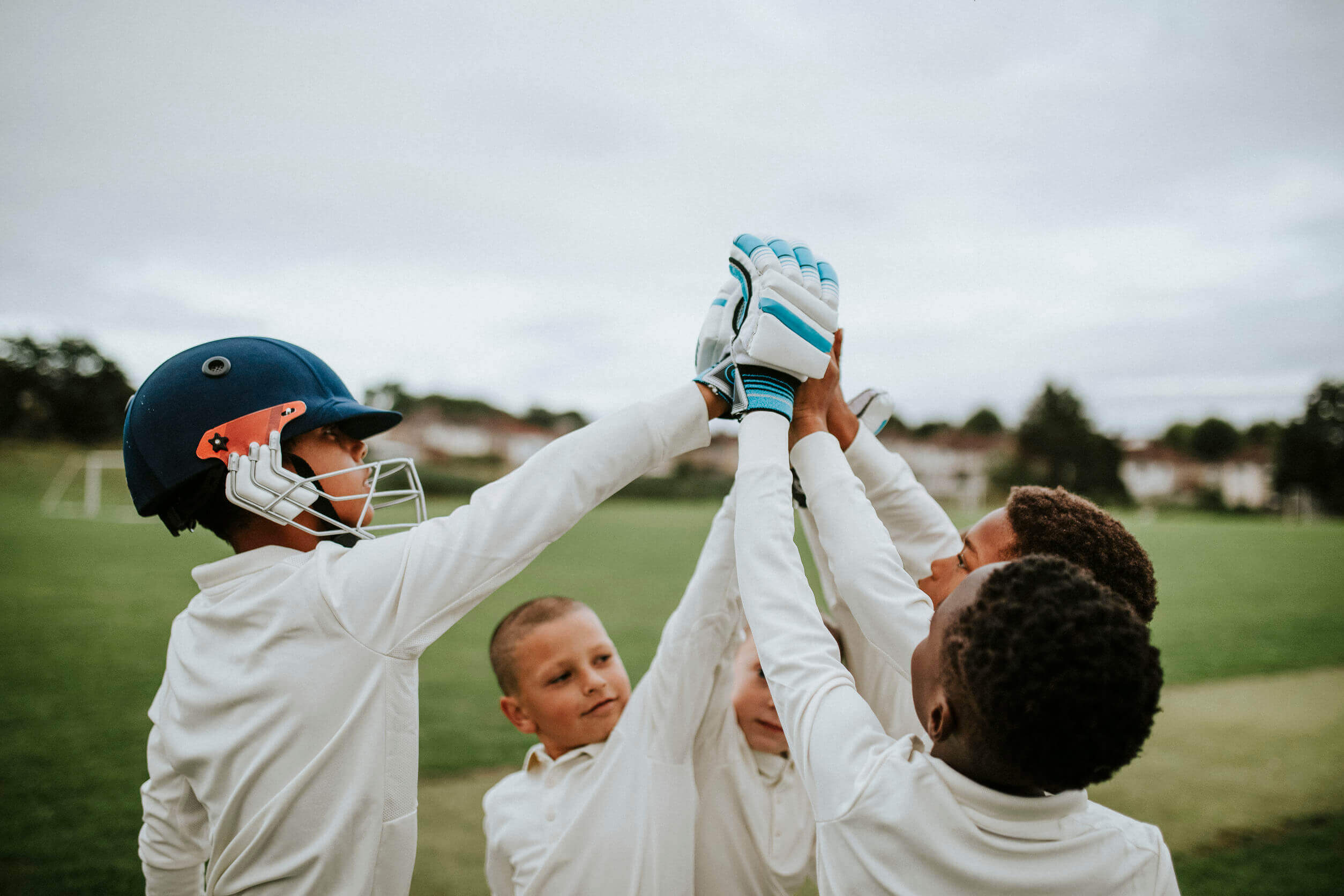Keys to Promote Empathy Through Sports


Written and verified by the professional writer and specialist in physical education Eva Maria Rodriguez Diego
Empathy is the ability to focus on what other people understand and think about the world. It’s also a fundamental skill when practicing sports. In fact, it can make quite a difference in times when the team is about to give up, or when it’s necessary to overcome difficult situations. That’s why we’ll talk about certain keys to promote empathy through sports in the following article.
As we all know, when people are able to show honest empathy towards other people, who are in pain or emotional stress, there’s a powerful calming effect. This will depend on the level of empathy a person can show towards the person who is upset.
Sports to promote empathy in children
Sports can help school-age children improve their social and emotional lives. In addition, they get to develop important skills, such as empathy. By playing sports, children get the chance to face failure and success. They also learn to work hard, cooperate and be fair.

Practicing sports, especially team sports, helps children understand their own emotions, as well as other people’s feelings. Furthermore, sports help children see themselves as loving and caring people, by giving them the chance to be generous.
How can you promote empathy through sports?
Next, we’ll give you some tips to promote empathy through sports.
Soften the tone
When playing sports, children receive many negative comments and instructions. And, the way we address them is fundamental to promote empathy.
As we all know, the tone in which people talk to us, whenever we receive positive or negative comments, is very important. When children receive feedback – positive or negative – in a soft, warm and supportive tone, they feel better. It also sets an example on how they should act in case they get to give someone else feedback about something.
Praise your children for helping others
If you praise your children for helping others, they’ll feel useful while doing it. Children need to see themselves as people who care about other people’s feelings, in order to be empathetic.
Following this idea, a research study found out that small children who were praised for helping others, were less likely to be generous in the future than those who were praised for being useful.
These results show that children prefer to pursue a positive identity. In addition, this motivation can be quite useful in order to promote prosocial behavior.
Help children find their inner hero through sports
Children love heroes. In fact, they find inspiration in the heroes they get to know in books or even in people who surround them. On the inside, every child wants to be a hero. Letting them practice sports is a great way to help children find their inner heroes.
Sports offer many different ways of helping children find their inner heroes. This is because there are many manners of being heroes, as long as they help others in noble and fair causes.

Promote empathy through sports by telling them stories
Through stories, children get to experience the ideas we want to convey. Actually, this can be a useful resource throughout their whole lives. When we tell them stories, children live through the characters and understand their inspiring ideas.
Furthermore, stories help children reflect upon the way other people feel when they face certain situations. As a result, they start developing the necessary skills to become empathic people. Remember that the world of sports can provide many inspiring stories to tell.
In conclusion, practicing sports is an excellent resource to promote empathy in children. However, don’t forget that setting an example for them is the best strategy to guide them into becoming empathic people.
Empathy is the ability to focus on what other people understand and think about the world. It’s also a fundamental skill when practicing sports. In fact, it can make quite a difference in times when the team is about to give up, or when it’s necessary to overcome difficult situations. That’s why we’ll talk about certain keys to promote empathy through sports in the following article.
As we all know, when people are able to show honest empathy towards other people, who are in pain or emotional stress, there’s a powerful calming effect. This will depend on the level of empathy a person can show towards the person who is upset.
Sports to promote empathy in children
Sports can help school-age children improve their social and emotional lives. In addition, they get to develop important skills, such as empathy. By playing sports, children get the chance to face failure and success. They also learn to work hard, cooperate and be fair.

Practicing sports, especially team sports, helps children understand their own emotions, as well as other people’s feelings. Furthermore, sports help children see themselves as loving and caring people, by giving them the chance to be generous.
How can you promote empathy through sports?
Next, we’ll give you some tips to promote empathy through sports.
Soften the tone
When playing sports, children receive many negative comments and instructions. And, the way we address them is fundamental to promote empathy.
As we all know, the tone in which people talk to us, whenever we receive positive or negative comments, is very important. When children receive feedback – positive or negative – in a soft, warm and supportive tone, they feel better. It also sets an example on how they should act in case they get to give someone else feedback about something.
Praise your children for helping others
If you praise your children for helping others, they’ll feel useful while doing it. Children need to see themselves as people who care about other people’s feelings, in order to be empathetic.
Following this idea, a research study found out that small children who were praised for helping others, were less likely to be generous in the future than those who were praised for being useful.
These results show that children prefer to pursue a positive identity. In addition, this motivation can be quite useful in order to promote prosocial behavior.
Help children find their inner hero through sports
Children love heroes. In fact, they find inspiration in the heroes they get to know in books or even in people who surround them. On the inside, every child wants to be a hero. Letting them practice sports is a great way to help children find their inner heroes.
Sports offer many different ways of helping children find their inner heroes. This is because there are many manners of being heroes, as long as they help others in noble and fair causes.

Promote empathy through sports by telling them stories
Through stories, children get to experience the ideas we want to convey. Actually, this can be a useful resource throughout their whole lives. When we tell them stories, children live through the characters and understand their inspiring ideas.
Furthermore, stories help children reflect upon the way other people feel when they face certain situations. As a result, they start developing the necessary skills to become empathic people. Remember that the world of sports can provide many inspiring stories to tell.
In conclusion, practicing sports is an excellent resource to promote empathy in children. However, don’t forget that setting an example for them is the best strategy to guide them into becoming empathic people.
All cited sources were thoroughly reviewed by our team to ensure their quality, reliability, currency, and validity. The bibliography of this article was considered reliable and of academic or scientific accuracy.
- 5 Tips for Cultivating Empathy — Making Caring Common. (2018). Reperado de: https://mcc.gse.harvard.edu/resources-for-families/5-tips-cultivating-empathy
- Bryan, C., Master, A., & Walton, G. (2014). “Helping” Versus “Being a Helper”: Invoking the Self to Increase Helping in Young Children. Child Development, n/a-n/a. doi: 10.1111/cdev.12244
- Kwon S. J. (2018). A relationship between personality and empathy in teenagers’ school sports club participation. Journal of exercise rehabilitation, 14(5), 746–757. https://doi.org/10.12965/jer.1836320.160
- Lorimer, R. (2013). The Development of Empathic Accuracy in Sports Coaches. Journal Of Sport Psychology In Action, 4(1), 26-33. doi: 10.1080/21520704.2012.706696
- Gano-Overway, Lori. (2013). The caring climate: How sport environments can develop empathy in young people. Routledgev
- García López, Luis & Gutierrez, David. (2015). The effects of a sport education season on empathy and assertiveness. Physical Education & Sport Pedagogy. 20. 1-16. 10.1080/17408989.2013.780592.
- Opstoel, K., Chapelle, L., Prins, F. J., De Meester, A., Haerens, L., van Tartwijk, J., & De Martelaer, K. (2020). Personal and social development in physical education and sports: A review study. European Physical Education Review, 26(4), 797–813. doi: 10.1177/1356336X19882054
- Schonert-Reichl, Kimberly. (2011). Promoting empathy in school-aged children: Current approaches and implications for practice. Routledge
- Şinoforoğlu, T., & Balçıkanlı, G. S. (2020). Investigating the Empathic Skills of Physical Education Teachers, Acta Educationis Generalis, 10(1), 58-67. doi: 10.2478/atd-2020-0004
- Suttie, J. (2016). Seven Ways to Foster Empathy in Kids. Recuperado de https://greatergood.berkeley.edu/article/item/seven_ways_to_foster_empathy_in_kids
This text is provided for informational purposes only and does not replace consultation with a professional. If in doubt, consult your specialist.








